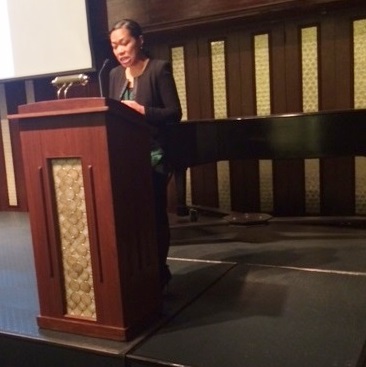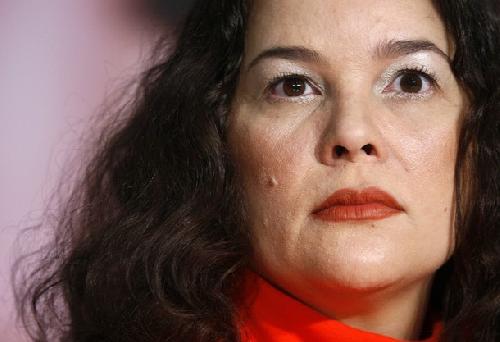In “Ma’ Rosa,” Cannes Best Actress Jaclyn Jose plays a meth dealer with eloquence, warmth
By Joel David
Brillante Ma. Mendoza’s “Ma’ Rosa” holds the distinction of being the second Filipino film to win at the Cannes Film Festival’s main competition. Even more impressive is the fact that the previous winner, “Kinatay” (2009), was also made by Mendoza, who won for direction. “Ma’ Rosa” copped a “lesser” prize (best actress for Jaclyn Jose), but as any observer of Philippine movie awards will confirm, any performance award makes a bigger splash with the local public, because of the way it plugs into the star system.
Jose’s achievement has the additional allure of the unexpected: among a long list of respected actors, she had long been relegated to secondary status (“supporting,” in awards parlance), although she managed to land a well-received lead role or two every decade since the 1990s. She emerged as an already-accomplished talent in late 1984, and had Lino Brocka scrambling to cast her in as many fallen-women roles as he could commission; in a couple of years, she earned an enviable notoriety for dominating sex-themed films without any compunction about shedding off all her clothes while delivering performances that won her a series of critics’ prizes. (Several of these 1985-86 titles may be found, remastered but unsubtitled, at Jojo Devera’s “Magsine Tayo!” Tumblr blog.)
The standard procedure among Philippine film experts is to run a commutation test (following John O. Thompson’s prescription) imagining how the role would have turned out if it had been performed by Nora Aunor. Hard though it may be to believe, certain roles had always tended to lie beyond the reach of the country’s foremost film performer – sex roles, for example, like the ones that Jose once specialized in. Jose in “Ma’ Rosa” acquits herself sufficiently so that by the end of the presentation, one might still be able to speculate how Aunor could have enriched the role, but one would have to be too much of a Noranian to deny that Jose succeeded in creating an iconic character, one that would have been the logical outgrowth of the poverty-stricken sex kittens that she used to portray.
Jose’s predicament is matched by Mendoza’s. After witnessing how he had a series of increasingly controversial wins (topped by Roger Ebert’s sustained tirades against “Kinatay”), people now feel righteous enough to point out that his latest outing proffers yet another variation on his “poverty-porn” material. Once more it is anchored by his long-time collaborator (and “Ma’ Rosa” consultant) Armando Lao’s vérité-inspired found-story approach, focused on the dregs of society trying desperately to make ends meet, with the police force behaving as a sinister and ruthless extension of a negligent state leaving its vulnerable Third-World populace to be buffeted by the combined forces of postcolonial neoliberalism, climate change, and uneven development patterns.
Yet “Ma’ Rosa” shares certain properties with some of Mendoza’s best work. It has the suspenseful exposition of “Tirador” (2007), the warmth of “Foster Child” (2007), the technical expertise of “Serbis” (2008), and even casts an actor from his first film, “Masahista” (2005), to play the same role as a gay sponsor. Jose as the title character and Julio Diaz as her husband appeared as a married couple not just in “Serbis” but also in William Pascual’s “Takaw Tukso” (1986), where Mendoza worked as production designer (and performs the same function in “Ma’ Rosa,” as he did for a number of his previous films).
Even more unexpected is the easy way that the current release lends itself to a second screening. “Ma’ Rosa” appears to promise further insights beyond what an initial viewing conveys, and dutifully manages to fulfill that promise. We see the worst of the policeman behaving tenderly toward a couple of youthful drug users, and the entire corrupt police force bantering playfully with a gay minor, Dahlia, who acts as their office maid.
Ma’ Rosa herself comes across as an exemplary businessperson, with enough sense (unlike her good-for-nothing husband) to avoid using the very product she dispenses and to keep a detailed sales record that winds up incriminating her; indeed her strong-woman genes seem to have thankfully persisted, with her daughter (played by Jose’s real-life offspring) the only one among her children still in school. Once we know Ma’ Rosa’s sub-rosa activities, and we see her purchasing instant noodles at the beginning of the film, we then find ourselves noting the irony of how certain products cause extensive health damage yet some of them can be acquired legally while others have to be handled with full awareness and acceptance of the risks involved.
An overlooked aspect of Mendoza’s work is his handling of women performers, and Jose’s Cannes prize serves as reminder for us to reconsider the several elderly actresses he had provided with rare opportunities to showcase their abilities: Aunor for “Taklub” (2015) and “Thy Womb” (2012), Anita Linda and Rustica Carpio for “Lola” (2009), Maribel Lopez for “Kinatay,” Gina Pareño for “Serbis,” and Cherry Pie Picache for “Foster Child;” an exceptional case would be Coco Martin, the closest to a Mendoza signature actor, who burst on the scene with “Masahista” and has become a household name (while occasionally reappearing in Mendoza films) as Philippine independent cinema’s most vital contribution to the mainstream industry.
Jose’s reading of her role is complemented by the high level of performance of the rest of the cast. Mendoza is one of the few indie filmmakers who can command people with leading-role backgrounds to play supporting characters, from Lopez’s single-scene appearance as Ma’ Rosa’s resentful sister-in-law Tilde, to Baron Geisler and Mark Anthony Fernandez as police officers who look snappily elegant when they finally don their uniforms but with Ma’ Rosa’s (and the audience’s) complete understanding of their monstrous potential, and Kristoffer King as Ma’ Rosa’s even-tempered drug dealer who grows increasingly menacing when he realizes how she had betrayed him to their neighborhood’s criminal police gang.
The film’s much-admired open ending, where Ma’ Rosa nearly chokes on street food as she beholds a fate she’d been trying to avoid (a homeless family with their ambulatory store) also turns on the several problems that await her: insurmountable debt, spiteful neighbors and relatives, military-sponsored enemies, the loss of her primary source of income. Her husband will seek more solace in his drug habit, her daughter will be unable to finish her schooling, her eldest son will complete his transition to street thuggery, her youngest son will continue selling his body to predatory gay men. The “ice” she sold merely represented a more extensive underlying sociopolitical and moral corruption, and all she had tried to do was keep her home and family together using what resources were available to her. Through Jose, via Mendoza’s steerage, the cliché about the woman embodying the nation becomes a cold, hard, unavoidable truth.
Joel David is Professor for Cultural Studies at Inha University in Incheon, Korea and was founding Director of the University of the Philippines Film Institute. His archival blog, Amauteurish! contains digital editions of his books and articles on Philippine cinema.















You got some unique content here.